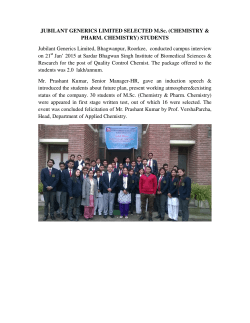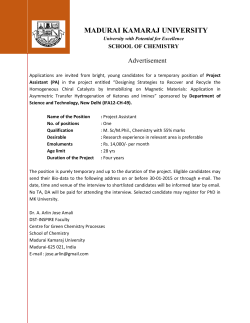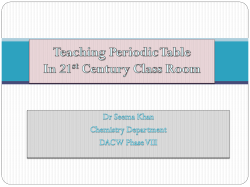
Chem 262H
Chemistry 262H; S. J. Meek Honors Organic Chemistry II – Chem 262H Spring 2015 Instructor: Professor Simon Meek (sjmeek@unc.edu); Venable 1307 (919-962-0359) Class: Monday, Wednesday & Friday 9:05 am –9:55 am; Venable G307 Pre/Co-requisites: A grade of C- or better Chem 261 or 261H. It is an Honor Code violation to be enrolled in a course lacking the proper pre- and co-requisites. Q & A Sessions: Monday Friday Textbook: “Organic Chemistry”, Bruice, 7th Ed. “Organic Chemistry Student Study Guide and Solutions Manual”, Paula Bruice Course Website: All course materials will be posted at: sakai.unc.edu 4:00-5:00 pm 3:00-4:00 pm Venable 1301 Venable 1301 (CHEM262H.001.SP15) Course Description: Chemistry 262H is the second half of a two semester, cumulative overview of organic chemistry. We will examine the chemistry of carbonyls, carboxylic acid derivatives, aromatics, and amines as well as biological molecules: carbohydrates, proteins. Foremost, students in this course should endeavor to develop an understanding of the properties and reactivity of important functional groups in organic chemistry. Grappling with unfamiliar mechanisms, predicting the products of organic reactions, and applying reactions to chemical synthesis will be significant and recurring themes. Implicit in this undertaking is an aggressive approach toward problem solving and pattern recognition. As you learned in 261, organic chemistry challenges you to wrestle with new concepts, to retain a large volume of information, and to apply these tools in unfamiliar settings. Expect to work hard in this class. Exams: Hour Exam I Hour Exam II Hour Exam III Final Exam 2/4 3/6 4/10 5/4 (Wednesday) (Friday) (Friday) (Friday), 8:00-11:00 am Final exam rescheduling policy: http://www.unc.edu/ugradbulletin/procedures1.html A request to reschedule your final exam time will not be considered in the absence of (a) a written examination excuse from the Dean of your school; or (b) an "Official Permit to take Final Examination to remove grade of AB” from the Office of the Registrar (this can be obtained if the student is on the Infirmary List). I want to grade your best effort. If your mean-adjusted final exam score is better than any of your mean-adjusted hour exam scores, I will replace your lowest mean-adjusted hour exam score with the mean-adjusted final exam score. In the event that you must miss a single hour exam for medical reasons or other emergencies circumstances, the score on your final exam will be inserted as your missed hour exam score. An absence from a second hour exam will result in a score of 0 for that exam. No makeup hour exams will be given; there will be no exceptions to this policy. Grading: Three hour exams (50%); Final exam (40%); quizzes (10%). Final letter grades will be assigned in accord with the Academic Polices in the College of Arts and Sciences, which describes the meaning of grades as follows (http://advising.unc.edu/AcademicPoliciesProcedures): Chemistry 262H; S. J. Meek A - Mastery of course content at the highest level of attainment that can reasonably be expected of students at a given stage of development. The A grade states clearly that the student has shown such outstanding promise in the aspect of the discipline under study that he/she may be strongly encouraged to continue. B - Strong performance demonstrating a high level of attainment for a student at a given stage of development. The B grade states that the student has shown solid promise in the aspect of the discipline under study. C - A totally acceptable performance demonstrating an adequate level of attainment for a student at a given stage of development. The C grade states that while not yet showing any unusual promise, the student may continue to study in the discipline with reasonable hope of intellectual development. D - A marginal performance in the required exercises demonstrating a minimal passing level of attainment for a student at a given stage of development. The D grade states that the student has given no evidence of prospective growth in the discipline; an accumulation of D grades should be taken to mean that the student would be well advised not to continue in the academic field. F - For whatever reasons, an unacceptable performance. The F grade indicates that the student's performance in the required exercises has revealed almost no understanding of the course content. A grade of F should warrant an adviser's questioning whether the student may suitably register for further study in the discipline before remedial work is undertaken. The final grading scale (“curve”) will be created to reflect these assessments. Honor Code: “Since all graded work (including homework to be collected, quizzes, papers, mid-term examinations, final examinations, research proposals, laboratory results and reports, etc.) may be used in the determination of academic progress, no collaboration on this work is permitted unless the instructor explicitly indicates that some specific degree of collaboration is allowed. This statement is not intended to discourage students from studying together or working together on assignments which are not to be collected.” As you know, the Honor Code (http://honor.unc.edu/) is a cornerstone in maintaining academic integrity at Carolina. I take it extremely seriously and expect you do as well. While I do not anticipate problems, you should know that I have no hesitations about reporting Honor Code violations. Class Rules: Please be respectful of both the instructor and your classmates: Be early. It is disrespectful and disruptive to your classmates and to me to be late. No mobile phone use. You may leave your phone on vibrate in the event there is an Alert Carolina broadcast message, but your mobile is not to be used otherwise. No laptop use without explicit instructor permission. If you want the materials that have been posted on Sakai, you should print them before coming to class. Drawing chemical structures is a key component of organic chemistry and you can’t do this on a laptop. Chemistry 262H; S. J. Meek APPROXIMATE COURSE OUTLINE Problems at the end of chapters are required insofar as you are responsible for all of the included material on exams. Date Topic Reading Assignment Assigned Problems (Minimum) 9-Jan Introduction; NMR 15.1–15.5 Ch15:3–6,11–14,16,18,19,20,23,24,26,27,33,46,48– 55,58,60,61,64,65,66,70,73 12-Jan 15.6–15.11 14-Jan 15.12–15.15, 15.17 Examples 16-Jan 19-Jan No class 21-Jan Aldehydes & Ketones 17.1–17.6 23-Jan 17.6–17.12 26-Jan 17.12–17.16 17.16–17.19, 12.1–12.3 28-Jan 30-Jan Organometallics Ch17:2,5,6,13,14,18,20,28,33–35,37,39,40,41,44,47,49– 52,54,56,58,59,61,62,66,69,70,71,75,79 Ch12:1,4,8,9,10,20,24,25,26,27,28,34,35,36 12.3–12.5 2-Feb 4-Feb Exam 1 6-Feb Carboxylic acids 16.1–16.22 Ch16:3,4(a,c,e,g),6,11,13,15,16,18,23,24,28,30–32,41,43– 45,47,56,57,58,60,63,64,70,71,75–78,81,86,89,93 Reactions at the α-carbon 18.1–18.20 Ch18:4,5,7,8,10,11,12,14,16-24,26-42,47,52-56,5862,64,65,67-74, 79,81,87 9-Feb 11-Feb 13-Feb 16-Feb 18-Feb 20-Feb 23-Feb 25-Feb Synthesis 27-Feb 2-Mar Aromaticity Reactions of benzene 4-Mar Reactions of benzene 6-Mar Exam 2 9-Mar No class 11-Mar No class 13-Mar No class 16-Mar Reactions of substituted benzenes 18-Mar 8.1–8.2; 8.7–8.12; 8.15 19.1–19.9 Ch19:4,6–9,13,15,16,18–29,32,34,35,42,43,44,48,52,53, 55,56,57,59,60,62,63,69,73,74,86,86,87,91 19.10–19.18 19.21–19.24 20-Mar 23-Mar Amines 25-Mar Amines 20.1–20.8 Ch20:4,5,6,9,22,23,24,25,27 Chemistry 262H; S. J. Meek 27-Mar Carbohydrates 21.1–21.11 1-Apr Carbohydrates No class 21.12–21.17 3-Apr 6-Apr Amino acids, proteins Ch21:1–5,7–14,19–23,25,31,37,66 Ch22:2,5–8,10,11,21–23,27,28,33,35,38,47,50,55,62,63,70 22.1–22.7 8-Apr 10-Apr 22.8–22.17 13-Apr 15-Apr 8.19–8.20; 28.1–28.7 Ch8:48,50,51,52,56;Ch28:1–3,5–10,12–15,19–20,23– Ch23:1–6,8–16,18,25–27,29–31,33–34,38–40,42–43,46 Exam 3 Pericyclic reactions 27,32,34,37 17-Apr 20-Apr Catalysis 23.1–23.7 22-Apr 24-Apr To be determined 4-May Final - 8 am Studying: Organic chemistry is a course that builds upon key concepts throughout both semesters. In this course, you will be asked to learn additional concepts, to recall and to apply these concepts to solve problems. It is vital to your success that you review reactions and concepts from Chem 261 at the beginning of the semester in order to be adequately prepared for Chem 262H. To aid in understanding the material, it is advisable that you review your notes daily as opposed to waiting until the night before the exam to study. In addition to reviewing your notes, you are strongly encouraged to work through the assigned problems in the text and to come to my Q & A sessions* if you have any questions. The best advise for obtaining a good grade in this class: practice, practice, practice. *Individual Meetings: These are intended to address big picture questions: deeper understanding of concepts, connecting topics, course studying, etc. About This Course Understanding organic chemistry is not unlike learning a foreign language. Gifted linguists do not develop without daily practice of the art. If you wish to learn organic chemistry, be proactive and industrious in your approach to it. I recommend the following at a minimum: i. Come to class prepared. This is a no-brainer. Much of organic chemistry is conceptually new and if you’ve introduced yourself to key ideas before I lecture on them, they will sink in faster. If you are prepared, it will be easier to thoughtfully consider the content of the lecture rather than passively scribble down the notes, trying to digest them later. I will do what I can to make the class time an active, rather than passive information exchange. In this context, you should be prepared to think about and answer questions that I pose. ii. Do something for this course every day. You will learn and retain more if you spend some time each day reading the text, studying notes, doing Mastering Chemistry or working problems, rather than doing (e.g.) five hours once a week (or twelve hours the night before the exam). To let more than two days pass without a substantial out-of-class effort is courting disaster. iii. Do all the problems. Do not skip working the problems, look at the answers, and say “Oh, I understand that now.” Chances are good that you don’t, at least not to the degree needed. Hold off on checking the answers until you have wrangled, wrestled, and discussed. Look up related material in the notes and the appropriate text chapter. You will only learn the content by adopting a thorough and aggressive approach toward problem solving. iv. Get help early. If you are having problems with the material, seek help early in the semester. Halfway through the course is way too late. Chemistry 262H; S. J. Meek v. Use summary sheets/flash cards. As new reactions and concepts are introduced, prepare a summary sheet or flash card that contains: (a) the name of the reaction (b) general example (use R groups); include all necessary reagents, solvents, and reaction conditions. Include workup conditions where appropriate. (c) Specific examples (d) Step-by-step mechanism showing electron movement with curved arrows (e) Stereochemistry of the reaction (if applicable) (f) Any electronic or structural effects on the reaction For studying purposes, grouping reactions by category is helpful. vi. Studying in groups can help. Group studying can be effective when everyone is working hard and at a similar level of understanding. It can also give a false sense of understanding if the group comes up with an answer that is not completely obvious to the individual. If you study in groups, do not fall into the trap of feeling that your understanding of the material is more advanced than it is. vii. The purchase of a molecular model set (Student Stores) is strongly recommended. Much of what you will learn requires visualizing molecules in three dimensions. Constructing molecular models is one of the best ways to understand the shape and conformation of organic molecules. You will be able to use your model sets on exams. viii. Chemistry Resource Center (M-Th 1-6 PM; Kenan Laboratory C143). Free chemistry help when you need it or cannot make it to my office hours. NOTES AND CLASS TIME This will be a lecture-based course and you will be responsible for taking notes during class. Although attendance is not factored into your final grade, it is highly encouraged that you do not miss any classes. If you miss a class, it is your responsibility to copy the notes from one of your classmates. Reading assignments for each section are given above, as are the hourly exam dates. The final exam date is scheduled by the University Registrar. Course Structure Introduction: Some of this course will be taught using team-learning techniques. A growing body of evidence indicates that active, collaborative learning is the most effective method of information transfer. Most, if not all, of the science courses you have taken rely heavily on lectures as the mechanism of information transfer. While lecture remains an important and indispensable teaching tool, exclusive reliance on it has been documented to be less effective with respect to understanding and retaining material presented in the course. Student Responsibilities: Team learning in this course will entail group problem solving sessions conducted in class under my “supervision”. At the end of a given class period, I will make available online a handout on material that will be covered in the next class period. This material will be supplemented with material from your text. It is the student’s responsibility to carefully study this material before coming to the subsequent class period. This “background” information will be employed as the basis for an in-class problem session that will augment your understanding of the material you covered outside of class. For team learning to be effective, you must come to class prepared. To promote this, we will have brief (5-10 minute) quizzes at the beginning of class periods. These quizzes are intended to be simple if you have studied the assigned material. Your quiz scores will count toward you final grade. Problem Solving Class Sessions: The Monday/Wednesday/Friday course schedule lends itself well to a format wherein we have a problem-solving sessions during the Monday/Wednesday class and a “normal” lecture on Wednesday/Friday. In this way, you will have three days (Friday to Monday) to assimilate the Chemistry 262H; S. J. Meek new material before a problem session. The problems I will distribute after your quiz on Monday/Wednesday will be something akin to a problem set. You will be working in groups of three/four. The following things are important in the group setting: • Each group member must be vocal and contribute. There will be disagreement on how to solve a given problem. This format provides a forum to discuss your opinion and provide the evidence to support it. You know you have a strong grasp of material when you are able to explain it to someone else! • Each group member should feel an obligation to your colleagues. If you come to class unprepared, you will hinder your own development, and the progress of your colleagues. • Respect your colleagues. Listen to what they have to say and learn from them. It is an important skill to be able to voice your opinion while respecting the opinions of others. Summary: This format has been used successfully and with very positive student response in the past. You will learn the same material that has been taught in previous years. You will additionally begin to develop a skill, “scientific self-expression” if you will, that is necessary whatever your career goals and underdeveloped by more passive learning techniques. I encourage your feedback at any point and am willing to listen to any concerns you might have. Further Reading: If you wish to learn more about team learning techniques in organic chemistry, I encourage you to consult the following literature on the subject: (1) Dinan, F. J.; Frydrychowski, V. A. "A Team Learning Method for Organic Chemistry." J. Chem. Educ. 1995, 72, 429-431. (2) Birk, J. P.; Foster, J. "The Importance of Lecture in General-Chemistry Course Performance." J. Chem. Educ. 1993, 70, 180-182. (3) Gosser, D. K.; Cracolice, M. S.; Kampmeier, J. A.; Roth, V.; Strozak, V. S.; Varma-Nelson, P. PeerLed Team Learning: A Guidebook; Prentice Hall: Upper Saddle River, NJ; 2001. (4) Bradley, A. Z.; Ulrich, S. M.; Jones, M. J.; Jones, S. M. "Teaching the Sophomore Organic Course without a Lecture. Are You Crazy?" J. Chem. Educ. 2002, 79, 514-519. (5) Paulson, D. R. "Active Learning and Cooperative Learning in the Organic Chemistry Lecture Class." J. Chem. Educ. 1999, 76, 1136-1140. Disclaimer: The professor reserves the right to make changes to the syllabus, including project due dates and tests (excluding the officially scheduled final examination), when unforeseen circumstances occur. These changes will be announced as early as possible so that students can adjust their schedules.
© Copyright 2025










